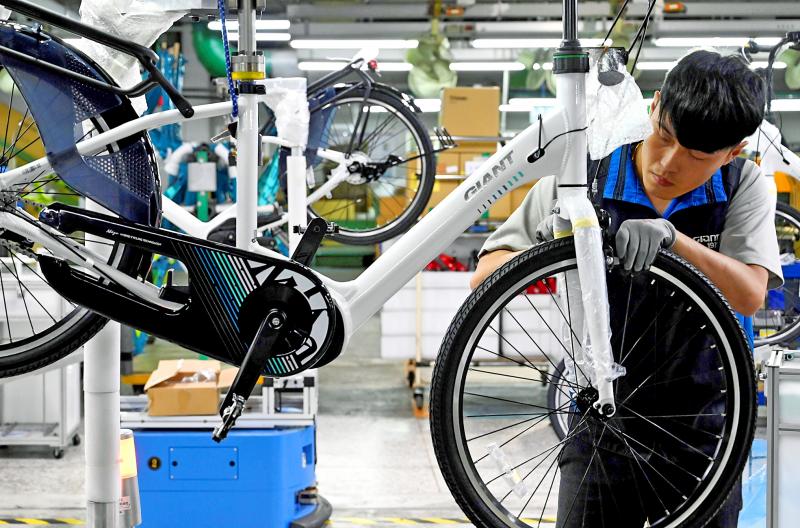The official manufacturing purchasing managers’ index (PMI) last month accelerated to 57.7, the fastest pickup since March 2018, as operating conditions brightened further on the back of new technology product launches, holiday inventory demand and 5G deployment, the Chung-Hua Institution for Economic Research (CIER, 中華經濟研究院) said yesterday.
It was the third straight month that the critical economic gauge rose with all sectors reporting an upturn in business, the first industry-wide growth since May last year, CIER said.
CIER president Chang Chuang-chang (張傳章) attributed the improvement to frontloading ahead of the Mid-Autumn Festival, new product releases by Apple Inc and continued 5G deployment.

Photo: AFP / Sam Yeh
“Even firms selling electrical and machinery equipment reported an uptick after a 16-month hiatus,” Chang said, suggesting that the recovery is across the board and healthy.
CIER economist Chen Hsin-hui (陳馨蕙) said Washington’s blacklisting of Semiconductor Manufacturing International Corp (中芯國際) and the launch of new smartphones and automobiles contributed to the PMI rise last month.
However, Kamhon Kan (簡錦漢), an economist at Academia Sinica’s Institute of Economics, warned of possible uncertainty faced by the electric and electronics sector.
He cited factors such as the US presidential election next month, a potential second wave of COVID-19 infection and the fading benefits of rush orders received by Taiwanese firms due to US sanctions on Huawei Technologies Co (華為).
PMI data aim to gauge the health of the local manufacturing industry, with values larger than 50 indicating expansion and scores lower than the threshold signaling contraction.
Earlier growth was limited to suppliers of biochemistry products and electronics used for remote working and learning.
The sub-index on new business orders last month fell from 62.5 in August to 61.4, while the reading on industrial production rose from 59.2 to 61.3, CIER’s report found.
The measure on raw material prices rose from 58.9 to 67.6, reflecting better demand for non-tech products, as countries around the world kept their economies open, despite rising coronavirus infections.
Overall, Taiwanese firms turned more positive toward inventory building, as evidenced by the increase in the sub-index from 50.6 to 53.3, while clients’ inventory reading rose from 41.9 to 42.5, but still remained in contraction mode, CIER said.
Local manufacturers are generally upbeat about the landscape moving forward, with the six-month business outlook climbing from 53.5 to 58.6.
However, suppliers of electrical and machinery equipment were the only sector that did not share the rosy sentiment, the CIER said.
The non-manufacturing index (NMI) fell 3.8 points from the previous month to 55.6, it said.
The NMI had expanded for four consecutive months and some degree of correction is harmless, Chang said.
Most service-oriented firms expect business to remain strong in the coming six months, even though companies in the hospitality and financial sectors have a dim view, CIER said.
Additional reporting by CNA

In Italy’s storied gold-making hubs, jewelers are reworking their designs to trim gold content as they race to blunt the effect of record prices and appeal to shoppers watching their budgets. Gold prices hit a record high on Thursday, surging near US$5,600 an ounce, more than double a year ago as geopolitical concerns and jitters over trade pushed investors toward the safe-haven asset. The rally is putting undue pressure on small artisans as they face mounting demands from customers, including international brands, to produce cheaper items, from signature pieces to wedding rings, according to interviews with four independent jewelers in Italy’s main

Japanese Prime Minister Sanae Takaichi has talked up the benefits of a weaker yen in a campaign speech, adopting a tone at odds with her finance ministry, which has refused to rule out any options to counter excessive foreign exchange volatility. Takaichi later softened her stance, saying she did not have a preference for the yen’s direction. “People say the weak yen is bad right now, but for export industries, it’s a major opportunity,” Takaichi said on Saturday at a rally for Liberal Democratic Party candidate Daishiro Yamagiwa in Kanagawa Prefecture ahead of a snap election on Sunday. “Whether it’s selling food or

CONCERNS: Tech companies investing in AI businesses that purchase their products have raised questions among investors that they are artificially propping up demand Nvidia Corp chief executive officer Jensen Huang (黃仁勳) on Saturday said that the company would be participating in OpenAI’s latest funding round, describing it as potentially “the largest investment we’ve ever made.” “We will invest a great deal of money,” Huang told reporters while visiting Taipei. “I believe in OpenAI. The work that they do is incredible. They’re one of the most consequential companies of our time.” Huang did not say exactly how much Nvidia might contribute, but described the investment as “huge.” “Let Sam announce how much he’s going to raise — it’s for him to decide,” Huang said, referring to OpenAI

The global server market is expected to grow 12.8 percent annually this year, with artificial intelligence (AI) servers projected to account for 16.5 percent, driven by continued investment in AI infrastructure by major cloud service providers (CSPs), market researcher TrendForce Corp (集邦科技) said yesterday. Global AI server shipments this year are expected to increase 28 percent year-on-year to more than 2.7 million units, driven by sustained demand from CSPs and government sovereign cloud projects, TrendForce analyst Frank Kung (龔明德) told the Taipei Times. Demand for GPU-based AI servers, including Nvidia Corp’s GB and Vera Rubin rack systems, is expected to remain high,